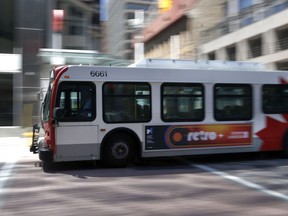Technology
OC Transpo Struggles with Reliability as Bus Delays Persist

OC Transpo is facing significant challenges in meeting its reliability targets, with ongoing delays and missed service expectations despite efforts to improve its operations. The transit authority, responsible for public transportation in Ottawa, has reported stagnant performance metrics, even after hiring additional drivers and mechanics, extending the O-Train service, and implementing a new bus route redesign.
Ottawa City Councillor Riley Brockington expressed concern during a recent transit commission meeting, stating, “We’re not seeing progress in our on-time performance metrics… despite clearing all these major hurdles.” The factors contributing to the ongoing reliability issues include a shortage of roadworthy buses and increasing traffic congestion on the city’s streets.
Bus Fleet Challenges and Traffic Issues
Currently, OC Transpo requires a minimum of 519 buses in service to meet passenger demand this fall. However, only 511 buses are available on average each day. In April, when the new bus route redesign was launched, the operational need was even higher, with a requirement for 540 buses but only 521 on the road.
The fleet of 738 buses is aging, with half of them exceeding their useful lifespan, leading to more frequent breakdowns and prolonged repairs. Gower indicated that around 30% of the buses are off the road daily due to maintenance issues. “That means runs will be cancelled, and there are limited spares available for when something goes wrong,” he noted, emphasizing the dire situation with little margin for error.
The delays are compounded by traffic congestion exacerbated by ongoing construction. Many bus-only lanes on the Transitway are currently unavailable due to the construction of the east LRT, forcing buses to navigate through mixed traffic. Gower explained, “There are some significant projects that are really having an impact. Construction of the east LRT is definitely having an impact on Highway 174, and when there is vehicle congestion, it affects buses.”
Future Plans for Improvement
The city is also grappling with a shift in commuter behavior as reliability issues lead some passengers to abandon public transit in favor of private vehicles. Gower acknowledged that this “vicious cycle” of declining ridership is a significant concern. “With all the issues we’ve had, I can totally understand why people are making a choice to switch from buses to cars,” he said.
To address the aging fleet, OC Transpo is in the process of expanding its electric bus capacity. Currently, there are 30 e-buses in operation, with approximately 21 in service daily. A comprehensive plan, approved by the city council, will see the purchase of 350 e-buses by 2027, funded through a combination of municipal resources and federal incentives. However, delays in manufacturing and supply chain issues are hindering the timely delivery of these new vehicles.
The city has also acquired an additional 11 used diesel buses to bolster its fleet, which are expected to be retrofitted and operational later this year. In a move to enhance capacity, OC Transpo is also procuring 50 diesel-powered high-capacity articulating buses, targeted for delivery in 2026 and 2027.
Despite these measures, some officials, including Councillor Wilson Lo, are advocating for a shift back to diesel or hybrid buses in light of the “untested abilities” of high-capacity electric buses. Lo’s motion will be debated in the upcoming transit committee, highlighting the need for a balanced approach to fleet renewal.
OC Transpo’s Director of Transit Customer Service and Planning, Pat Scrimgeour, emphasized the importance of a sustainable replacement strategy for the bus fleet. “We should be replacing 1/15th of our bus fleet every year,” he said, pointing out the necessity of maintaining a consistent age profile among the buses.
As OC Transpo navigates these challenges, officials are committed to improving service reliability and restoring public confidence in the transit system. The focus remains on strategic procurement and effective management of resources to meet the growing demands of Ottawa’s transit riders.
-

 World4 months ago
World4 months agoScientists Unearth Ancient Antarctic Ice to Unlock Climate Secrets
-

 Entertainment4 months ago
Entertainment4 months agoTrump and McCormick to Announce $70 Billion Energy Investments
-

 Lifestyle4 months ago
Lifestyle4 months agoTransLink Launches Food Truck Program to Boost Revenue in Vancouver
-

 Science4 months ago
Science4 months agoFour Astronauts Return to Earth After International Space Station Mission
-

 Technology2 months ago
Technology2 months agoApple Notes Enhances Functionality with Markdown Support in macOS 26
-

 Top Stories3 weeks ago
Top Stories3 weeks agoUrgent Update: Fatal Crash on Highway 99 Claims Life of Pitt Meadows Man
-

 Sports4 months ago
Sports4 months agoSearch Underway for Missing Hunter Amid Hokkaido Bear Emergency
-

 Politics3 months ago
Politics3 months agoUkrainian Tennis Star Elina Svitolina Faces Death Threats Online
-

 Politics4 months ago
Politics4 months agoCarney Engages First Nations Leaders at Development Law Summit
-

 Technology4 months ago
Technology4 months agoFrosthaven Launches Early Access on July 31, 2025
-

 Top Stories2 weeks ago
Top Stories2 weeks agoFamily Remembers Beverley Rowbotham 25 Years After Murder
-

 Top Stories5 days ago
Top Stories5 days agoBlake Snell’s Frustration Ignites Toronto Blue Jays Fan Fury





















